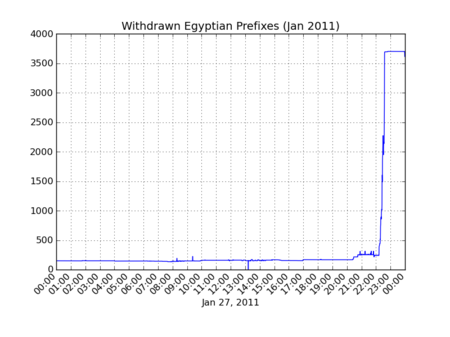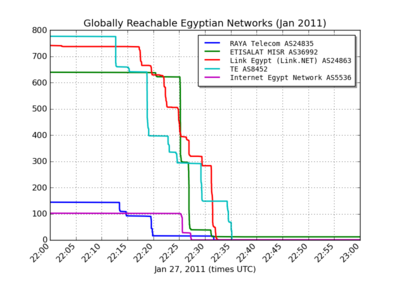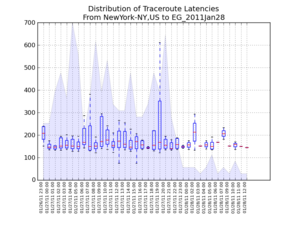
Egypt Leaves the Internet
James Cowie
Thanks to all for great comments and questions. Please see below for latest updates on the ongoing Egyptian Internet blackout, including some trace-based analysis and a few words about neighboring countries. After this morning we'll be closing this post out, and looking for the restoration. Hopefully sooner than later. --jim
Confirming what a few have reported this evening: in an action unprecedented in Internet history, the Egyptian government appears to have ordered service providers to shut down all international connections to the Internet. Critical European-Asian fiber-optic routes through Egypt appear to be unaffected for now. But every Egyptian provider, every business, bank, Internet cafe, website, school, embassy, and government office that relied on the big four Egyptian ISPs for their Internet connectivity is now cut off from the rest of the world. Link Egypt, Vodafone/Raya, Telecom Egypt, Etisalat Misr, and all their customers and partners are, for the moment, off the air.

At 22:34 UTC (00:34am local time), Renesys observed the virtually simultaneous withdrawal of all routes to Egyptian networks in the Internet's global routing table. Approximately 3,500 individual BGP routes were withdrawn, leaving no valid paths by which the rest of the world could continue to exchange Internet traffic with Egypt's service providers. Virtually all of Egypt's Internet addresses are now unreachable, worldwide.
This is a completely different situation from the modest Internet manipulation that took place in Tunisia, where specific routes were blocked, or Iran, where the Internet stayed up in a rate-limited form designed to make Internet connectivity painfully slow. The Egyptian government's actions tonight have essentially wiped their country from the global map.
What happens when you disconnect a modern economy and 80,000,000 people from the Internet? What will happen tomorrow, on the streets and in the credit markets? This has never happened before, and the unknowns are piling up. We will continue to dig into the event, and will update this story as we learn more. As Friday dawns in Cairo under this unprecedented communications blackout, keep the Egyptian people in your thoughts.
Update (3:06 UTC Friday)
One of the very few exceptions to this block has been Noor Group (AS20928), which still has 83 out of 83 live routes to its Egyptian customers, with inbound transit from Telecom Italia as usual. Why was Noor Group apparently unaffected by the countrywide takedown order? Unknown at this point, but we observe that the Egyptian Stock Exchange (www.egyptse.com) is still alive at a Noor address.
Its DNS A records indicate that it's normally reachable at 4 different IP addresses, only one of which belongs to Noor. Internet transit path diversity is a sign of good planning by the Stock Exchange IT staff, and it appears to have paid off in this case. Did the Egyptian government leave Noor standing so that the markets could open next week?
Update (17:30 UTC Friday)
The Internet routing situation for Egypt continues to be bleak, with an estimated 93% of Egyptian networks currently unreachable. Renesys saw no significant improvements or changes in Egyptian international Internet routing overnight.
We have examined the takedown event more closely, looking at the sequence in which Egyptian service providers removed themselves from the Internet. The following plot shows the number of available networks for each of the significant providers, between 22:00 and 23:00 UTC last night (midnight to 1am Cairo time).

Our new observation is that this was not an instantaneous event on the front end; each service provider approached the task of shutting down its part of the Egyptian Internet separately.
- Telecom Egypt (AS8452), the national incumbent, starts the process at 22:12:43.
- Raya joins in a minute later, at 22:13:26.
- Link Egypt (AS24863) begins taking themselves down 4 minutes later, at 22:17:10.
- Etisalat Misr (AS32992) goes two minutes later, at 22:19:02
- Internet Egypt (AS5536) goes six minutes later, at 22:25:10.
First impressions: this sequencing looks like people getting phone calls, one at a time, telling them to take themselves off the air. Not an automated system that takes all providers down at once; instead, the incumbent leads and other providers follow meekly one by one until Egypt is silenced.
Update (14:00 UTC Saturday)
The Egyptian Internet blackout continues into its second full day, with no substantive change overnight. The government seems to have put itself in a tough position, as the Egyptian working week begins tomorrow, and with it, incredible disruptions to Egypt's economy and debt rating from the loss of Internet and mobile communications. With every hour that passes, the continuing comunications blackout is public evidence that they have utterly failed to regain control of the evolving situtation.

This plot shows the round-trip delays packets experienced between New York and Egypt in the days leading up to the blackout. The blue background shows the number of successful traces that reached their destinations inside the country. There's some variance in latency ahead of the shutdown, but not more than we'd consider normal for Egypt; that is, we don't see evidence of throttling or intentional congestion of the national Internet connections before everything goes dark. They seem to have gone straight from plan A (block twitter and facebook) to plan Z (turn off the Internet) without stopping at any intermediate solutions. Iran took the more subtle throttle-and-monitor approach after their dubious elections in 2009.
We've also been asked repeatedly whether other countries in the region are readying a "kill switch," and whether there are already outages in, for example, Syria. The answer, for now, is no. Syria's Internet connectivity appears to have been quite stable, as have other countries in the region, and nobody else has significant Internet connectivity problems so far.
I predict that Egypt's "kill switch" experiment will serve as a cautionary tale: the economic and reputational costs of the shutdown far exceed the benefits of regaining total information control.
We would also note that there appear to have been no significant disruptions to other countries' traffic passing through Egypt on fiberoptic cables such as SMW-4 and FLAG FEA.
As we've noted before, the majority of Internet connectivity between Europe and Asia actually passes through Egypt. The Gulf states, in particular, depend critically on the Egyptian fiberoptic corridor for their connectivity to world markets. Commodity traders are already nervous about the potential impacts on oil prices of any closure of the Suez Canal, but the potential risks to global Internet connectivity through Egypt are equally significant, and far less widely understood.
Are the folks at Davos thinking about this? They should be.
www.renesys.com/blog/2011/01/egypt-leaves-the-internet.shtml
Jan. 27, 2011
